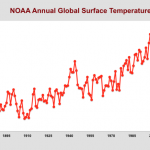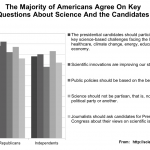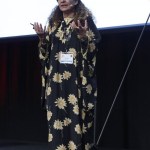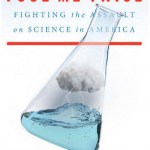Despite a greater percentage of people knowing about (and agreeing with) scientific issues, denialism remains a powerful political and psychological force that threatens to have its heyday under President Trump. As Peter Gleick writes on Significant Figures, "good policy without good science is difficult; good policy with bad science is impossible." Peter asks: what is the best way for scientists to engage the republic? Through testimony? Social media? Pop star status like Sagan, Bill Nye, and Neil deGrasse Tyson? Or is the open letter an effective form of public outreach? Meanwhile, on…
Science Policy
Among the different professional categories, scientists and engineers remain very highly respected by the public, at least compared to politicians, business leaders, the media, and even religious authorities. Part of this is due to the fact that success in the scientific enterprise depends on impartial analysis and independence from political ideology. And yet there are strong connections between science and policy: good policy without good science is difficult; good policy with bad science is impossible. Sure, there is plenty of bad policy made even in the face of contradictory scientific…
ScienceDebate.org is an organization that, for years now, has been pushing to get the candidates running for President of the United States to engage in a debate over science policy, just as they debate foreign policy, or economic policy, etc.
And, ScienceDebate.org has had some success. Some of the candidates, at the primary level, have engaged in such a debate, and at the national level, some of the candidates have contributed written answers to citizen-generated questions about science policy.
And now, they've done it again.
The four main candidates (two actual main candidates and two…
I had previously mentioned the ScienceDebate ad with the kids asking for a science debate. Here is some local coverage on the story (the ad was made here in the Twin Cities) including an interview with one of the stars, Susanlyn Singroy. (I don't agree with everything she said, but what the heck, she's asking for a debate, and is up for it!)
Here is the coverage.
More about ScienceDebate.org here.
... maybe they'll actually do something about them.
Remember the Democratic and Republican party debates that were held just before that major international meeting about climate change, participated in by every country in the world? Of course you do. Do you remember the candidates' responses to the questions about climate change posed during those debates? No, you don't. Not a single question about climate change, or any other big science issue, was asked.
When we think about the big science issues, climate change is often one of the main topics that comes first to mind. But there are many…
The Time Scales of Political and Climate Change Matter
The US is engaged in the laborious process of electing a new leader, who will likely be President for 8 years. Climate change has finally become an issue in US electoral politics. The climate policies of the next US President, and the Congress, will have a direct impact on the climate, because those policies will affect how much fossil carbon is put into the atmosphere over coming decades. So it is vital to consider what the climate may do during the next administration and the longer period that will include that administration’s…
It is debate season for the US presidential race. As usual, science is being viewed as a debating point very differently by the two parties, at least so far. The Democratic candidates, yet to actually debate, are currently engaged in dealing policy statements about important scientific issues such as climate change. In previous election cycles, science was brought into Republican primary debates to see which candidate could make the most anti-science statements. This year it is a bit different, with climate science in particular, and one's ability to say something intelligent-sounding about…
Yesterday was policy day, as far as keynote speakers were concerned. Lidia Brito is the UNESCO director of science policy and capacity building. Among the usual points about the need to change, building capacity and recognizing stakeholders, here is what I believe is her take home message: Science is changing, and that's a good thing. We need to keep going in this direction, but change it even more.
Collaborations across countries and continents, the rise of science in China and India, and yes, MOOCs. In other words, we need to actively help create equality in science education and science…
The Science Debate Project, co-founded by my friend Shawn Otto of Minnesota, has been trying to get candidates for the office of President to engage in a public debate about science. There has been resistance to that idea, but at least, Obama and Romney were willing to answer a set of questions related to science and science policy. The questions with the President's and Romney's answers are HERE. A press release regarding the project is here.
Romney wants to improve education by allowing parents to send their kids to charter and private schools, and he wants to fund that. He is not sure…
Last week, I had the privilege of attending the launch of a new initiative from the Union of Concerned Scientists - The Center for Science and Democracy. The UCS itself was founded in the late 1960's in response to the Cold War nuclear arms race. Graduate students and faculty at MIT decided that someone needed to advocate for "greater emphasis on applying scientific research to pressing environmental and social problems rather than military programs." That goal seems even more important in today's political climate, though the issue today is not between environment/society…
Fool Me Twice
Fool Me Twice: Fighting the Assault on Science in America" was officially released last night in Minneapolis with appropriate fanfare and celebration. Everyone who gets to know Shawn likes him from the start and quickly learns to respect him and eventually hold him with a certain amount of well-earned awe, and like any book, we've all seen this one coming for quite some time. (I have an old pre-release copy in which every page is "00" but, surprisingly, the front cover is just like the final form.)
Shawn gave a talk at the release party, but since he is held in such high…
For a short 5 minute tour of Bill Gates tackling the controversy of GE crops, please see the blog ERV. Thanks for the plug ERV
If you have 45 minutes, watch the entire video here. Bill is serious, sincere and a good speaker with important concepts to convey:
The video starts about 11 minutes in.
In his recent TED Talk Sam Harris, author of The End of Faith and Letter To A Christian Nation argues that science can and should be used to address moral issues. His newest book, The Moral Landscape: How Science Can Determine Human Values, will be published in October, 2010.
For more see Sam Harris, Franics Collins, and the NIH, The Feeling of What Happens, and the debate with Michael Shermer, Deepak Chopra, and Jean Houston Does God Have A Future?
With yesterday's announcement of the historic nuclear arms treaty signed by Russia and the United States (that would reduce existing stockpiles by as much as 30%) I thought I would repost my piece on Edward Teller's nuclear legacy from September, 2003 that was originally commissioned by The Nation magazine (though ultimately went unpublished). Also see my posts Intimidating the Soviets: A Hiroshima Anniversary Memorial and The Population Bomb, Nuclear Winter and the Role of Science in Public Advocacy. Yesterday's treaty is the first step in dismantling the nuclear policies that this would-…
"But Dr. Zaius, the benefits to apedom far outweigh this animal's suffering."
Image: Planet of the Apes
Greg Laden has posted three parts (with more on the way) of a series that looks at how we should decide what animals have rights, what those rights should be, and how we weigh those considerations against the benefits of animal testing:
It is not entirely unreasonable to view the question of what humans can do to other species with suspicion. This would be the same kind of suspicion that a parole board would level against an inmate asking for release. We are a species with a record, and we…
Five years ago Lawrence Summers, then president of Harvard, made headlines when he suggested that women are not as well represented in science because of "issues of intrinsic aptitude." By proposing that women are biologically less capable of succeeding in science he gained the anger of many of his colleagues and continued his reputation for divisive management (African-American Studies professor Cornel West reportedly left Harvard for Princeton based on disagreements he had with Summers).
Now, a report released today on the representation of women in science reveals that, while there are…
Image Source: Monkeys in the NewsMonkeys In the News has alerted me to an Associated Press story today about a Nevada research lab, part of Charles River Laboratories, that is one of the world's largest suppliers of clinical and laboratory research services to pharmaceutical and biotech companies. The company was fined after thirty monkeys died as the result of not following proper procedures. While it is clear that there are necessary medical reasons for using primates in invasive experiments, I think everyone can agree that strict regulations need to be put in…
In light of the recent discussion on animal testing and animal rights I thought a few additional points would be valuable. It is a fact that animal testing leads to some necessary medical advances that save lives. Anyone who would say differently doesn't have the slightest clue what they're talking about and should be dismissed out of hand. The question is an issue of how many, especially given the ethical concerns. It is also a fact that the vast majority of animal testing serves more peripheral goals, categorized as applied studies that include cosmetic, chemical and pharmaceutical…
Hits of the week:
Savage Minds (with a spiffy website redesign) asks Why is there no Anthropology Journalism?
Jerry Coyne takes sharp exception to both a paper and a SciAm Mind Matters article by Paul Andrews and Andy Thomson arguing that depression might be an evolutionary adaptation. Dr. Pangloss punches back. (NB: 1. I was founding editor of Mind Matters, but no longer edit it, did not edit the Andrews/Thomson piece, and don't know any of these people. 2. While my recent Atlantic article presented an argument for how a gene associated with depression (the so-called SERT gene) might be…
As I wrote yesterday in my piece for The Huffington Post, the history of Western financial involvement in Haiti has been one of growing the nation's textile industry despite the fact that 70% of Haiti's annual income comes from agriculture. By emphasizing programs such as HOPE and HOPE II, the United States has increased the profits of American companies, but the livelihood of Haitian workers has decreased at nearly the same rate.
[A] 2009 report by the Congressional Research Service found that "assessments of the effectiveness of Hope I, however, were disappointing." Since 2004 Haitian…









